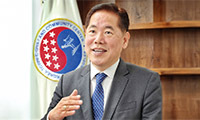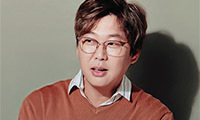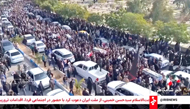Staff Reporter
SEOUL The Chin dynasty, the first consolidated empire that ruled much of present-day China proper, fell due to internal dispute.
The demise of the Romans sprawling federation resulted from the coziness they indulged in for hundreds of years, inducing a sense of complacency that their empire would last forever.
In both cases, there was more than what meets the eye about the cause of the downfalls failure to meet changing parameters.
Now, the sun seems to be setting on one of Korea? modern-day empires Hyundai Business Group.
According to its own statistics, Hyundai encompassed 83 affiliates ranging from door-to-door service to shipbuilding and automobile manufacturing as of the end of 1999.
Its combined annual sales amounted to 97 trillion won and assets to 90 trillion won against debts of 70 trillion won.
Hyundai is about to let go of its most profitable affiliates those related to automobile production and shipbuilding reducing Korea? largest business empire to a shadow of its former self. Its disintegration appears to be unstoppable and troubled.
Its demise, if it occurs as predicted, could be attributable to all of the factors that toppled the great ancient empires.
As happened in the transition of power from founder to son in the Chin era, Hyundai suffered a series of internal struggle among the sons of its 85-year-old founder Chung Ju-yung and his siblings for the throne.
Although it is disputable, the start of the internal dispute was the duel between Se-yung, Ju-yung? younger brother, and Mong-koo, the founder? eldest living son, for Hyundai Motor.
Mong-koo easily won the battle. But in retrospective, it was only the beginning of what was coming.
One thing led to another as Mong-koo waged a fierce battle with his younger brother Mong-hun. Mong-hun emerged as the winner, taking the title of group chairman for himself and relegating his elder brother as head of Hyundai Motor.
Both sides laid their claim to the throne, arguing that their aging father was on their respective side.
At one point, the Mong-koo camp staged a coup using his father? written order that he be reinstated as group chairman, but the elder Chung? order was later declared null and void for reasons Hyundai is reluctant to reveal even today.
The two camps fought tooth and nail, neglecting to pay attention to spreading discontentment among investors. The first hiccup was a liquidity crunch that befell its financial units.
Lee Ik-chi, Mong-hun? chief lieutenant and former head of Hyundai Securities, played a big role in stitching together a self-rescue package that comprised plans for Chung to put up his personal assets and invite foreign investment to conduct a major financial house cleaning. The promise has not been translated.
But Hyundai says that the U.S.-based American International Group (AIG) could throw in $1 billion but a closer look at the potential AIG deal reveals that it is just another desperate attempt to sell corporate assets at a fire-sale price. Proof is that W. Ross, a corporate raider whose reputation is "notorious" among market watchers, is a member of the AIG-led consortium.
With this, Hyundai Construction? trouble has come to the fore.
Some market watchers say that Hyundai? expansionist move is partially to blame, as Hyundai? holding firm is said to be behind Hyundai? inter-Korean business endeavor. Hyundai Construction is a major shareholder with a 25 percent stake in Hyundai Asan Corp., the group? spearhead for business in North Korea.
The riot that started on the fringe of the markets is spreading to the center.
Investors are no longer listening to what Hyundai says, believing that their collective calls for restructuring have fallen on deaf ears. Their wrath is boiling over, the stock markets being apt testimony. Smelling blood, creditors are pulling in their credits rather than allowing their rollover.
"Hyundai Construction is the seed of the Hyundai Group, created with the blood, sweat and tears of founder Chung," a Hyundai spokesman said. "Mong-hun, his heir, will do all he can irrespective of whether he will be able to save it or not in the end."
A Hyundai Construction official said, "We will never give up Hyundai Construction. Mong-hun has returned and things can change." Chung has been a virtually deadbeat son for a month, going on an overseas trip when Hyundai Construction narrowly escaped bankruptcy, leaving his octogenarian father in charge.
These remarks show the group? failure to adjust to a new, changing set of parameters fitting the New Economy, according to market watchers.
Some market watchers see that Hyundai is throwing good money after bad. Even if Hyundai poured in everything it had, it would be hard to save Hyundai Construction, as their theory goes.
"In the end, the creditors will conduct a capital decrease, a major debt for equity swap and hand the firm over to a special purpose vehicle," one market participant said. "Should it exhaust everything now, how will they deal with looming difficulty at Hyundai Electronics Industries, one quarter of whose 8 trillion won in debts will mature in the first quarter of next year?"
The writing on the wall is unmistakable. The investors riot is threatening the very seat of the Hyundai empire and the creditors hounding the blood of the men on and around the throne, but there appears no sign that a white knight is coming soon.
The inner circle members surrounding the throne seem to be indulging in the myth of "too big to fail" which they themselves helped to build.
But taken in a bigger context, empires rise and fall. Perhaps the same fate is finally happening to Hyundai Group.
스마터리빙
more [ 건강]
[ 건강]이제 혈관 건강도 챙기자!
[현대해운]우리 눈에 보이지 않기 때문에 혈관 건강을 챙기는 것은 결코 쉽지 않은데요. 여러분은 혈관 건강을 유지하기 위해 어떤 노력을 하시나요?
 [ 건강]
[ 건강]내 몸이 건강해지는 과일궁합
 [ 라이프]
[ 라이프]벌레야 물럿거라! 천연 해충제 만들기
 [ 건강]
[ 건강]혈압 낮추는데 좋은 식품
[현대해운]혈관 건강은 주로 노화가 진행되면서 지켜야 할 문제라고 인식되어 왔습니다. 최근 생활 패턴과 식생활의 변화로 혈관의 노화 진행이 빨라지고
사람·사람들
more
[한인단체 신년 인터뷰] 시니어센터 이현옥 회장… “풍성하고 아름다운 노년의 공간”
활발한 프로그램 운영과 높은 커뮤니티 참여로 지역 내 대표적인 커뮤니티 기관으로 평가받는 LA 한인타운 시니어&커뮤니티 센터(이하 시니어센터)…

변진섭 ‘희망사항’ 콘서트
센터메디컬그룹이 2026년 새해를 맞아 회원과 가족, 시니어를 위한 문화체험 공연으로 가수 변진섭 콘서트를 오는 2월27일(금) 오후 8시부터…
코윈 LA지부 ‘2026 골프 토너먼트’
세계한민족여성네트워크(KOWIN) LA 지부(회장 김주희)는 오는 2월2일(월) 캘리포니아 웨스턴 힐스 컨트리클럽에서 ‘골프 토너먼트 2026…
남가주 한국학원 새학기 교사연수회
남가주한국학원(이사장 박성수·교육감 신춘상)은 지난 10일 본부 강당에서 2025-26학년도 2학기 교사연수회를 개최했다. 이날 연수회에는 남…
[한인단체 신년 인터뷰] KYCC 송정호 관장… …
LA 한인타운 대표 비영리단체 한인타운청소년회관(KYCC)의 송정호 관장은 “지금 우리가 하는 일은 커뮤니티 ‘니즈’가 있기 때문에 존재한다”…
많이 본 기사
- 한인 변호사가 ‘신탁자금 횡령’… 줄줄이 ‘중징계’
- 무서운 ‘독감’… 한인 5세 아동 사망
- 골프 카트 전복… 50대 남성 사망
- 취업비자 심사 강화… 인터뷰 연기·지연 속출
- ‘북한으로 무기 밀수’ 중국인 등 7명 기소
- LA 교육구 일제히 개학… 활기 되찾은 타운 학교들
- “노래방 불법 운영 자율적 규제… 치안 협조”
- 추가 시간에 세 골 ‘난타전’… 바르셀로나, 레알 잡고 수퍼컵 2연패
- 아르헨티나 대형 산불… “20년래 최악의 환경비극”
- 트렌턴, 멜로스, 시실리, 레욱트라
- 에드워즈 결승 뱅크슛… 미네소타, 샌안토니오에 대역전승
- 올해 IRS(연방 국세청) 세금보고 개막… 26일부터 접수 시작
- 포스코 ‘배터리 핵심’ 리튬 생산 글로벌 ‘탑3’로 도약
- 30년 평균 모기지 금리 5%대로 하락
- “해외 한인 인재들 공직자 유치”
- ‘케데헌’ 골든글로브 2관왕… 오스카 보인다
- 카드 이자 10%로 제한 트럼프, 새 규제 추진
- 돌파구 못찾는 LG그룹… 시총 4위마저 흔들
- 미네소타 시위 확산에 ‘강경 대응’
- “이란 시위로 648명 사망… 6천명 넘게 숨졌을 가능성”
- ‘종말의 날’ 비행기가 왜 LA에?
- 여자 세계 1위 사발렌카 브리즈번 인터내셔널 우승
- 법무부, 연준 파월 의장 수사 개시 ‘파문’
- [경제단체장 신년 인터뷰] “최신 회계정보 제공·봉사활동 강화”
- 광복회, 회장 연임 무효 논란 ‘내홍’
- 애플, AI파트너로 구글 제미나이 낙점
- [한인단체 신년 인터뷰] 시니어센터 이현옥 회장… “풍성하고 아름다운 노년의 공간”
- 이강인, 복귀 준비 착착… ‘맞춤형 훈련’
- 갑자기 쥐어짜는 듯한 복통·설사·혈변… ‘허혈성 대장염’
- “목회자도 생활비 필요한데”… 외면돼 온 재정 현실
- [존청 변호사의 “경제·법률 핫이슈”] 10만달러 체납 세금 독촉 통지, 5천달러로… IRS 조정 신청
- 유니스 이 신임이사장 한국어 진흥재단 선출
- 국제 금값 최고치 경신 연준의장 기소위협 요인
- [지평선] 다시 듣는 김광석
- 미 ITC ‘갤워치’도 조사… 웨어러블 특허 소송전 격화
- 변진섭 ‘희망사항’ 콘서트
- 코윈 LA지부 ‘2026 골프 토너먼트’
- 2,000달러 ‘관세 배당’ 연소득 10만불 이하 유력
- 가주 의회 ‘미주 한인의 날’ 선포식
- 상장지수펀드 미국까지 넓히고 AI 투자는 옥석 가리기
- LA 시장 선거 구도와 선택지
- 연준까지 장악하려는 트럼프… “독립성 최대 시험대”
- 손아귀 힘 약할수록 당뇨병 발생 위험 높다
- [경제 트렌드] 스타트업서 가장 인기있는 창업자 학위는
- 먼로 독트린과 돈로 독트린
- ‘눈의 詩經’
- 한인은행 자산·외형 성장세 지속… 호프·한미 ‘탑10’
- 공화의원, ‘그린란드 美 51번째주 편입’ 법안 발의
- [화요칼럼] 어머님 전(前) 상서
- [업계 소식] 목, 허리 디스크및 협착증 치료 최고 권위
1/5지식톡

-
 한국 안경을 무료 배송으로 받아보실…
0
한국 안경을 무료 배송으로 받아보실…
0안녕하세요. 서울 안암동에 위치한 ‘보고싶다 안경원’입니다.저희는 다년간 한국 고객분들께 착용감 좋은 안경테와 한국안경브랜드,고압축 도수 렌즈를 합리적인 가격에 제공해온 안경 전문점입니다.이번에 해외 배송이 가능해…
-
 미 육군 사관학교 West Poin…
0
미 육군 사관학교 West Poin…
0https://youtu.be/SxD8cEhNV6Q연락처:wpkapca@gmail.comJohn Choi: 714-716-6414West Point 합격증을 받으셨나요?미 육군사관학교 West Point 학부모 모…
-
 ☝️해외에서도 가능한 한국어 선생님…
0
☝️해외에서도 가능한 한국어 선생님…
0이 영상 하나면 충분합니다!♥️상담신청문의♥️☝️ 문의 폭주로 '선착순 상담'만 진행합니다.☎️ : 02-6213-9094✨카카오톡ID : @GOODEDU77 (@골뱅이 꼭 붙여주셔야합니다…
-
 테슬라 자동차 시트커버 장착
0
테슬라 자동차 시트커버 장착
0테슬라 시트커버, 사놓고 아직 못 씌우셨죠?장착이 생각보다 쉽지 않습니다.20년 경력 전문가에게 맡기세요 — 깔끔하고 딱 맞게 장착해드립니다!장착비용:앞좌석: $40뒷좌석: $60앞·뒷좌석 …
-
 식당용 부탄가스
0
식당용 부탄가스
0식당용 부탄가스 홀세일 합니다 로스앤젤레스 다운타운 픽업 가능 안녕 하세요?강아지 & 고양이 모든 애완동물 / 반려동물 식품 & 모든 애완동물/반려동물 관련 제품들 전문적으로 홀세일/취급하는 회사 입니다 100% …
케이타운 1번가
오피니언
 노세희 부국장대우·사회부장
노세희 부국장대우·사회부장 먼로 독트린과 돈로 독트린
 민경훈 논설위원
민경훈 논설위원트렌턴, 멜로스, 시실리, 레욱트라
 한형석 사회부 부장대우
한형석 사회부 부장대우 LA 시장 선거 구도와 선택지
 정유환 수필가
정유환 수필가 [화요칼럼] 어머님 전(前) 상서
 이왕구 / 한국일보 논설위원
이왕구 / 한국일보 논설위원[지평선] 다시 듣는 김광석
 박기섭
박기섭 ‘눈의 詩經’
 옥세철 논설위원
옥세철 논설위원‘좀비(zombie)체제’가 무너질 때…

돈로 독트린
 조지 F·윌 워싱턴포스트 칼럼니스트
조지 F·윌 워싱턴포스트 칼럼니스트 [조지 F. 윌 칼럼] 트럼프의 무면허 괴물 사냥
1/3지사별 뉴스

‘ICE 총격’ 주말 미 전역 항의 시위
미네소타주 미니애폴리스에서 연방 이민세관단속국(ICE) 요원의 총격에 30대 시민권자 여성이 사망한 사건에 항의하는 대규모 시위가 주말동안 뉴…
“귀화 시민권 박탈 기준 검토” 파장

새 VA 주지사는 의원을 좋아해
민주당 아비가일 스팬버거(Abigail Spanberger) 버지니아 주지사 당선자는 오는 17일 취임을 앞두고 내각 인선을 거의 마무리한 상…
VA 페어팩스 세금 폭탄에 기업·주민‘탈출 러시’우려

트럼프 압박에 파월 ‘발끈’…사상초유 대통령-연준의장 정면충돌
트럼프 대통령과 중앙은행 수장이 정면 충돌하는 사상 초유의 상황이 전개되고 있다.제롬 파월 연방준비제도(Fed·연준) 의장이 자신을 겨냥한 도…
살림으로 뿌리내리다- 테이크루트 안미정 대표의 요리 이야기 (9)



















































.png)


댓글 안에 당신의 성숙함도 담아 주세요.
'오늘의 한마디'는 기사에 대하여 자신의 생각을 말하고 남의 생각을 들으며 서로 다양한 의견을 나누는 공간입니다. 그러나 간혹 불건전한 내용을 올리시는 분들이 계셔서 건전한 인터넷문화 정착을 위해 아래와 같은 운영원칙을 적용합니다.
자체 모니터링을 통해 아래에 해당하는 내용이 포함된 댓글이 발견되면 예고없이 삭제 조치를 하겠습니다.
불건전한 댓글을 올리거나, 이름에 비속어 및 상대방의 불쾌감을 주는 단어를 사용, 유명인 또는 특정 일반인을 사칭하는 경우 이용에 대한 차단 제재를 받을 수 있습니다. 차단될 경우, 일주일간 댓글을 달수 없게 됩니다.
명예훼손, 개인정보 유출, 욕설 등 법률에 위반되는 댓글은 관계 법령에 의거 민형사상 처벌을 받을 수 있으니 이용에 주의를 부탁드립니다.
Close
x